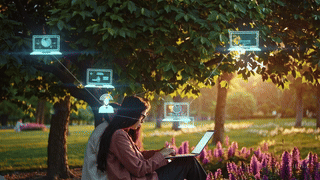How AI Agents and Multimodal Frameworks Are Redefining Work and Bringing Us Closer to Nature
- Clarence Andre Anthony
- Jan 16, 2025
- 4 min read

Artificial intelligence (AI) is not only transforming how we work but also empowering us to reconsider where, when, and how we work. Advancements in AI agents, multimodal frameworks, and cutting-edge tools like Abacus.AI, ChatGPT Operator, Google's AgentSpace, and Microsoft's Copilot are creating opportunities to escape the relentless “always-on” culture. By automating workflows, enhancing collaboration, and introducing smarter tools, AI is enabling humans to step away from work-first lifestyles, rediscover nature, and embrace healthier, more balanced living.
AI Agents: The New Pillars of Productivity
Intelligent Autonomy with AI Agents
AI agents now go beyond task automation—they act as dynamic, decision-making entities capable of executing complex workflows independently. They analyze data, generate insights, and even adapt strategies, freeing humans from micromanagement and allowing them to focus on higher-value pursuits—or simply take a break.
Key Tools Driving This Revolution:
Microsoft Copilot
Context-Aware Assistance: Copilot integrates with Microsoft 365 tools like Word, Excel, and Teams to provide personalized, context-driven suggestions, summaries, and automation.
Seamless Collaboration: It enables real-time editing, task management, and scheduling, reducing the need for constant human intervention in mundane activities.
Google AgentSpace
Multimodal Functionality: Google’s AgentSpace enables agents to process and interpret text, images, videos, and more, making them versatile tools for comprehensive analysis and problem-solving.
Interconnected Ecosystem: It connects across Google's tools, such as Workspace and Cloud, enabling autonomous task execution, from drafting proposals to generating presentations.
Abacus.AI and ChatGPT Operator
Scalable AI Solutions: Abacus.AI automates data workflows, real-time streaming, and predictive modelling.
Conversational Intelligence: ChatGPT Operator acts as a digital coworker, handling tasks like generating reports, answering queries, and coordinating operations autonomously.

AI-Powered Opportunities for a Nature-Oriented Lifestyle
The rise of advanced AI agents and multimodal frameworks is dismantling the traditional office environment, allowing individuals to shift away from the hyper-availability mindset that dominated the past two decades. These advancements offer people the opportunity to incorporate nature into their lives while maintaining productivity:
1. Reducing the Always-On Work Culture
AI agents excel at managing routine tasks, prioritizing urgent matters, and providing real-time updates, enabling humans to disconnect without compromising work outcomes.
Example: Microsoft Copilot can summarize meeting notes, delegate tasks, and respond to emails autonomously, eliminating the need for constant monitoring.
2. Switching Off with Confidence
Unlike traditional workflows, where rapid response times were crucial, AI agents enable asynchronous collaboration and decision-making. This shift allows workers to take meaningful breaks, spend time outdoors, and enjoy activities without worrying about missing critical updates.
3. Nature-Integrated Remote Work
With AI agents like Google’s AgentSpace and ChatGPT Operator, remote work becomes location-agnostic. Workers can stay productive from mountain lodges, beach cottages, or rural homesteads, integrating natural experiences into their routines.
4. Streamlined Multimodal Collaboration
Multimodal frameworks allow teams to share and analyze diverse data types—such as documents, visuals, and videos—without the need for in-person meetings. Tools like Google AgentSpace simplify cross-platform collaboration, enabling a seamless virtual office that fosters work-life balance.
5. Personalized Productivity
AI tools analyze individual work patterns and recommend optimal schedules or workflows. For example, Abacus.AI can identify peak productivity hours and offload tasks during downtime, allowing workers to enjoy more nature-based activities.
How AI Agents Transform Work-Life Balance
For two decades, work has revolved around rapid response times and constant availability, fostering burnout and disconnect from natural environments. AI agents are flipping the script by offering:
1. Autonomy in Task Execution
AI agents autonomously handle repetitive and time-sensitive tasks, enabling workers to focus on creative or strategic responsibilities while leaving the routine to machines.
Example: Microsoft Copilot can draft documents, manage schedules, and handle follow-ups, giving workers the freedom to step away.
2. Freedom from Constant Notifications
AI-driven prioritization means only critical tasks require immediate attention. Multimodal AI frameworks ensure that non-urgent matters are addressed efficiently, reducing stress and fostering a healthier lifestyle.
3. A Return to Nature-First Living
AI allows for a decentralized workforce, enabling individuals to move away from urban centres. This creates opportunities for living in nature-rich environments, reducing the environmental impact of commuting and city-centric work.
Realizing the Vision
For AI-driven lifestyles to fully thrive, a few enablers are essential:
Reliable Infrastructure: Expand high-speed internet and cloud computing to rural and remote areas.
Adoption of AI Tools: Encourage businesses to integrate tools like Google AgentSpace and Microsoft Copilot for smoother transitions to decentralized work.
Cultural Shift: Organizations must value outcomes over constant availability, fostering trust in AI tools to handle routine tasks.
Sustainable Workspaces: Develop eco-friendly coworking hubs that combine technology with natural surroundings.
Benefits for Individuals and Society
For Individuals:
Reduced stress and burnout.
Greater opportunities to explore nature and prioritize personal well-being.
More time for hobbies, mindfulness, and creative pursuits.
For Society:
Lower environmental impact from reduced commuting and urban congestion.
Decentralized living patterns, reviving rural economies.
A focus on sustainability and eco-conscious growth.

Conclusion
The advancements in AI agents, multimodal frameworks, and tools like Microsoft Copilot, Google AgentSpace, Abacus.AI, and ChatGPT Operator are transforming not just how we work, but how we live. These technologies are dismantling the hyper-availability mindset that has dominated modern work, enabling humans to embrace balance, freedom, and reconnection with nature.
The office of the future isn’t a desk in a high-rise—it’s wherever inspiration strikes, whether that’s a mountainside, a forest glade, or your backyard garden. By leveraging these innovations, we can work smarter, live better, and rediscover the natural world that has long been overshadowed by screens and deadlines. The future of work is here—and it’s as green as it is intelligent.




Comments